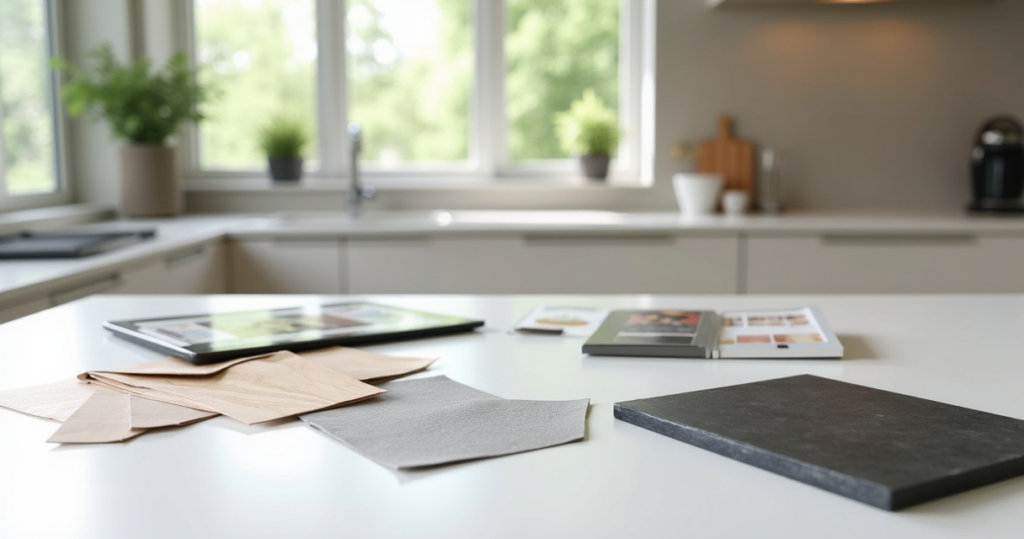You know what people always ask me? They have these beautiful, modern kitchens—sleek cabinets, gorgeous stone countertops—but something feels… missing. It feels a little cold, a little impersonal. They ask me, “Sophia, how do I bring warmth, how do I bring soul into this space without it feeling cluttered or old-fashioned?”
And my answer is always the same. We talk about the backsplash.
Because everyone thinks the backsplash is just the functional bit that stops spaghetti sauce from staining the paint. That’s the noise. What actually matters is that this is the vertical heart of your kitchen. It’s the canvas. It’s the place where you can tell a story, whisper a memory, or shout with joy. It’s where generations of craftsmanship can live and breathe right next to your state-of-the-art coffee maker. I’ve noticed everyone is obsessed with being perfectly seamless and neutral, but they’re forgetting that the most beautiful things in life have a human touch. Let’s talk about how to get that back.
Planning Your Vision and Assessing Your Needs (Part 1)
Before you even think about tile, we need to think about the story. This isn’t about slapping something on the wall. It’s about creating a foundation for the feeling you want to have every morning when you walk in to make your coffee. It’s about laying the groundwork so the process is a joy, not a headache.
1. Defining Your Modern Kitchen Style Identity Clearly
Forget “style identity.” That sounds so rigid. Let’s talk about your kitchen’s alma—its soul. Where does your family’s heart lie? Is it in the minimalist calm of a Zen garden, the vibrant energy of a market in Cartagena, or the rustic warmth of a hacienda courtyard? Your inspiration isn’t just on Pinterest; it’s in your memories, your heritage, the places you’ve traveled that made your heart sing.
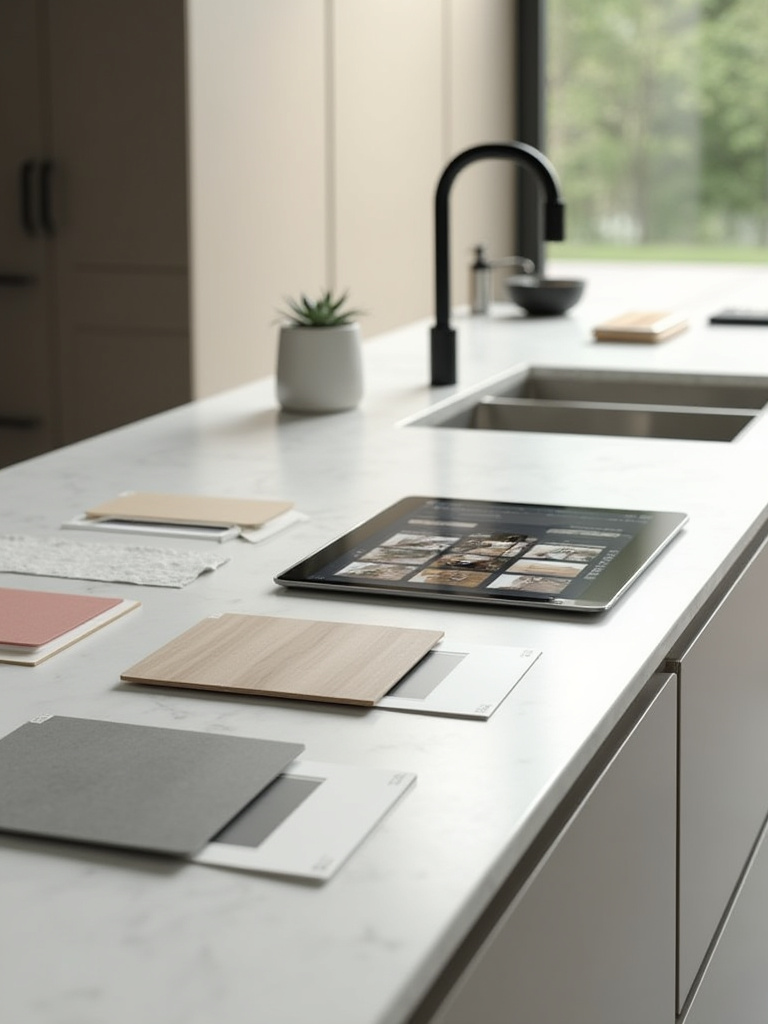
Start a real mood board, not just a digital one. Get scraps of fabric, paint chips, a postcard, a leaf from your garden. What textures and colors feel like you? I once had a client who was stuck, and then she showed me a photo of her grandmother’s embroidered shawl from Oaxaca. Boom. That was it. We found hand-painted tiles with the same deep indigo and terracotta colors, and her whole kitchen came alive with a story she loved.
2. Evaluating Current Kitchen Elements for Seamless Backsplash Integration
This isn’t about making everything match perfectly. A home that is too perfect has no soul! Think of it as a conversation. What are your countertops saying? A very busy, dramatic granite might be shouting, so your backsplash should probably be a good listener—something simple, textural, maybe in a solid color that lets the stone have its moment.
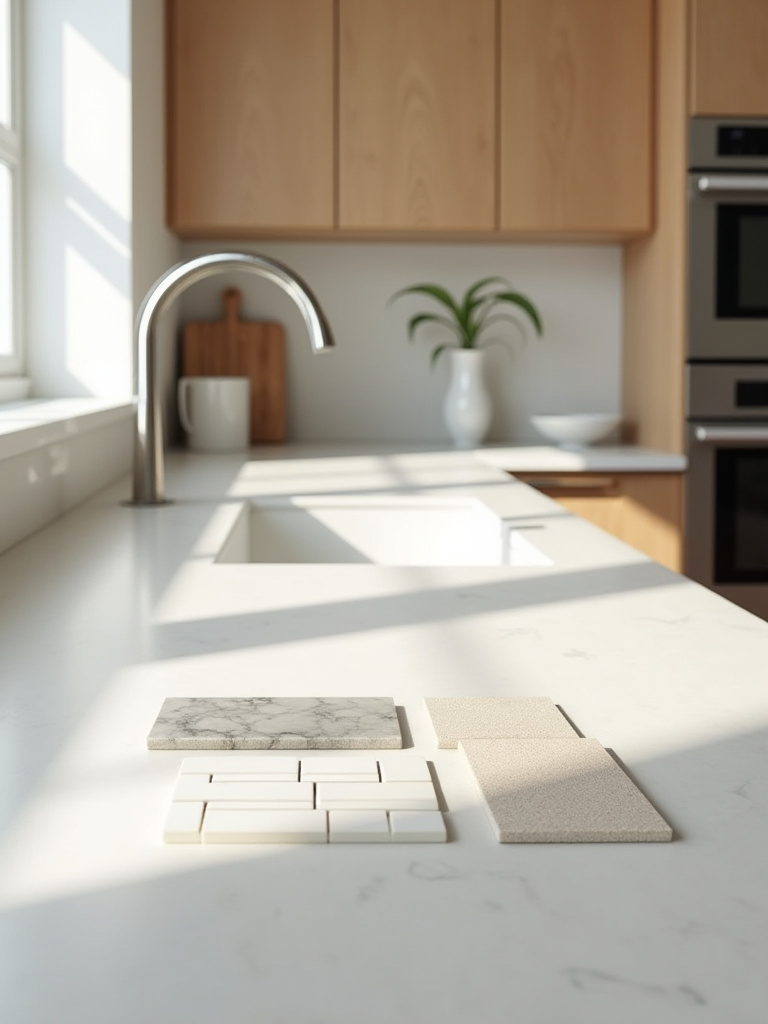
But if you have quiet, simple cabinets and counters, they’re inviting the backsplash to tell the story. This is your chance for a beautiful, hand-painted pattern or a rich, earthy terracotta. The most important thing I can tell you is to bring samples home. A tile can look completely different in the store than it will in your kitchen, under your light, next to your things. Live with it for a few days. See how it feels in the morning light versus the evening.
3. Establishing a Realistic Backsplash Budget from the Outset
Let’s have a real talk about money. Yes, handmade tiles from a small family workshop in Puebla, Mexico will cost more per square foot than something mass-produced from a big box store. But what are you paying for? You’re not just paying for a tile; you’re paying for a skill passed down through generations. You’re supporting a community and keeping an art form alive. It’s an investment in a piece of art that has a human story baked into its very clay.
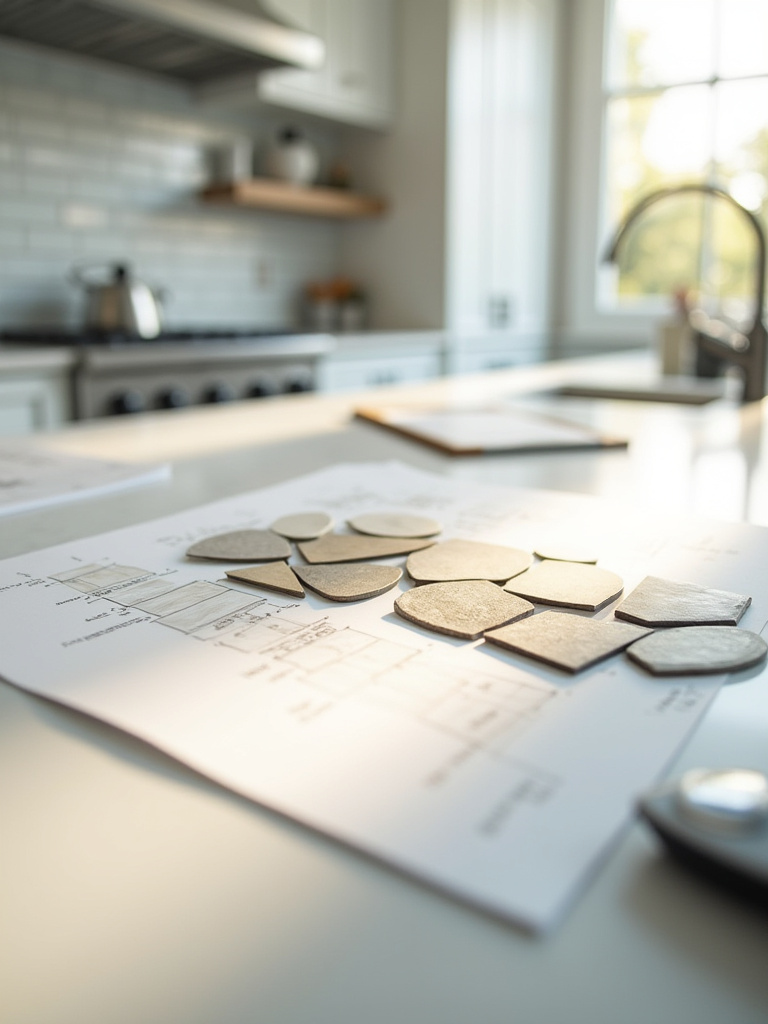
That said, you can be incredibly clever. You don’t have to do the entire kitchen in the most expensive tile. One of my favorite tricks is to create a “rug” of stunning, patterned cement tiles just behind the stove—a focal point, an altar to your cooking. Then, surround it with a simpler, more affordable tile. It makes the special tiles feel even more precious and keeps the budget in a happy place. Just be sure to account for everything: the tiles, the grout, the sealer, and the hands that will lovingly install it.
4. Measuring Backsplash Areas Precisely to Prevent Material Waste
This might sound boring, but it’s an act of respect. When you measure carefully, you are honoring the material and the artisan who made it. Every tile that is cut wrong or has to be thrown away is a little piece of that craft and story wasted. So measure twice, three times even. Measure your walls at the top, middle, and bottom, because I promise you, no wall is perfectly straight.
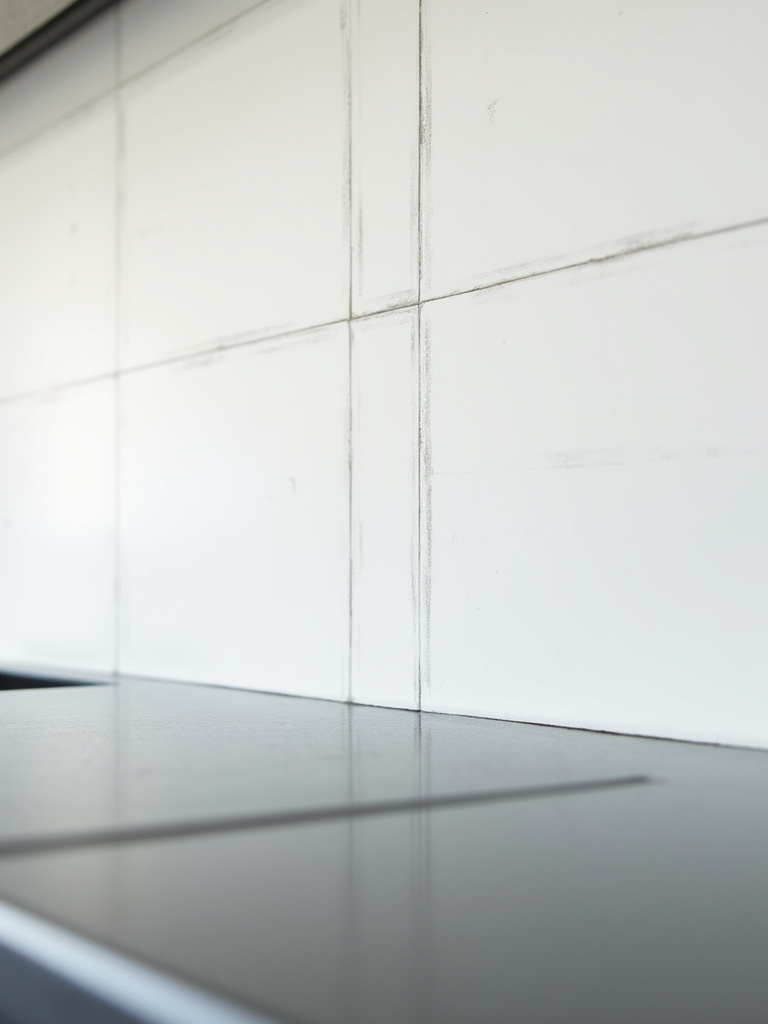
And please, always add 10-15% extra. Always. I learned this the hard way on one of my first projects. We were using these beautiful, impossible-to-replicate reclaimed tiles. We ran short by three tiles. It took weeks to find something that even came close, and it was a heartache I’ll never forget. That little bit extra is your insurance. It’s for the inevitable mis-cut, the one tile that cracks, or for that day years from now when you need to replace a small section.
Planning Your Vision and Assessing Your Needs (Part 2)
Now we move from the practical to the poetic. Where your backsplash starts and stops is one of the most important decisions you’ll make. This isn’t just about protecting the wall; it’s about drawing a line, creating a frame, and deciding how much of your story you want to tell.
5. Researching Optimal Backsplash Heights and Coverage Strategies
Think of your backsplash as a piece of art. Would you hang a tiny painting on a huge wall? Or stop a beautiful mural halfway up? Traditionally, a backsplash just filled the space between the counter and the upper cabinets. But a modern, soulful kitchen knows that this is a surface to be celebrated.
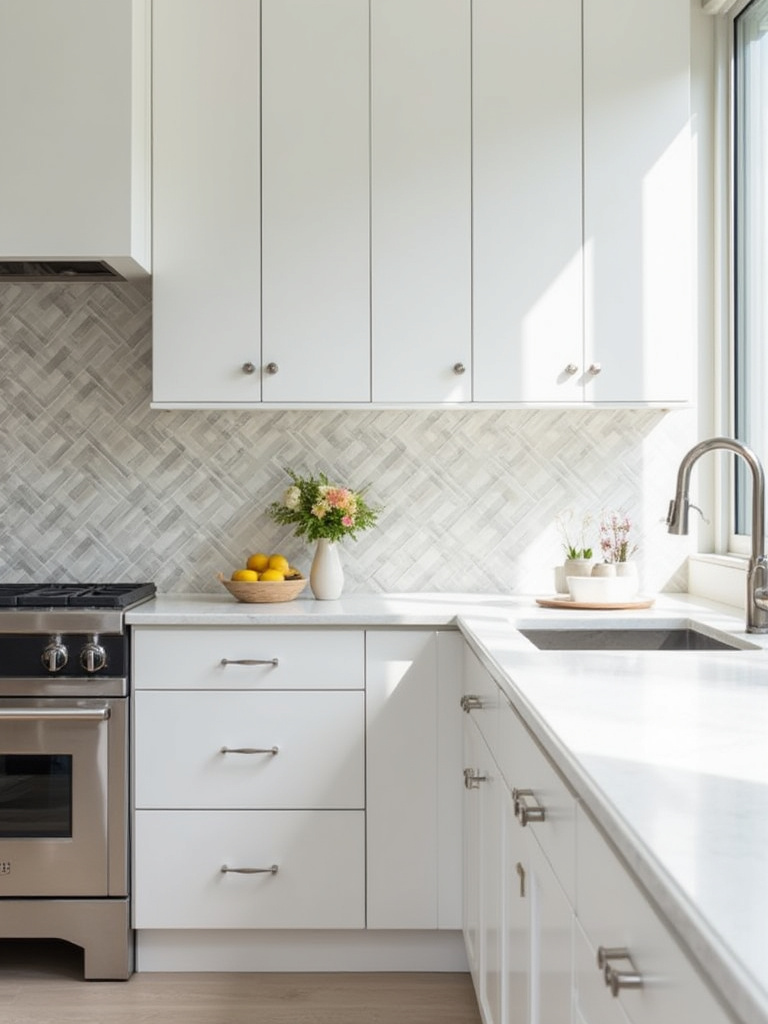
Taking your backsplash all the way to the ceiling, especially behind the stove or a set of open shelves, creates a stunning, dramatic moment. It turns a wall into a feature, a testament to the beauty of the material. In a smaller kitchen, this can draw the eye upward and make the whole room feel taller and grander. It’s a statement of confidence and love for the craft you’ve chosen. Don’t let an arbitrary cabinet line dictate where beauty should end.
Mastering Modern Materials and Textural Choices (Part 1)
This is where the magic happens. The material you choose is the language your kitchen will speak. Will it whisper in soft, earthy tones, or will it sing in vibrant, joyful colors? Let’s explore some of the beautiful dialects of design.
6. Embracing Large Format Tiles for Minimal Grout Lines and Expansive Looks
I know, large tiles sound very corporate and modern. But think of them differently. Imagine a single, beautiful piece of stone, like the Cantera quarry stone you see in San Miguel de Allende. Large format tiles give you that same feeling—an uninterrupted expanse that honors the material itself. With so few grout lines, the tile’s own texture or subtle pattern becomes the hero.
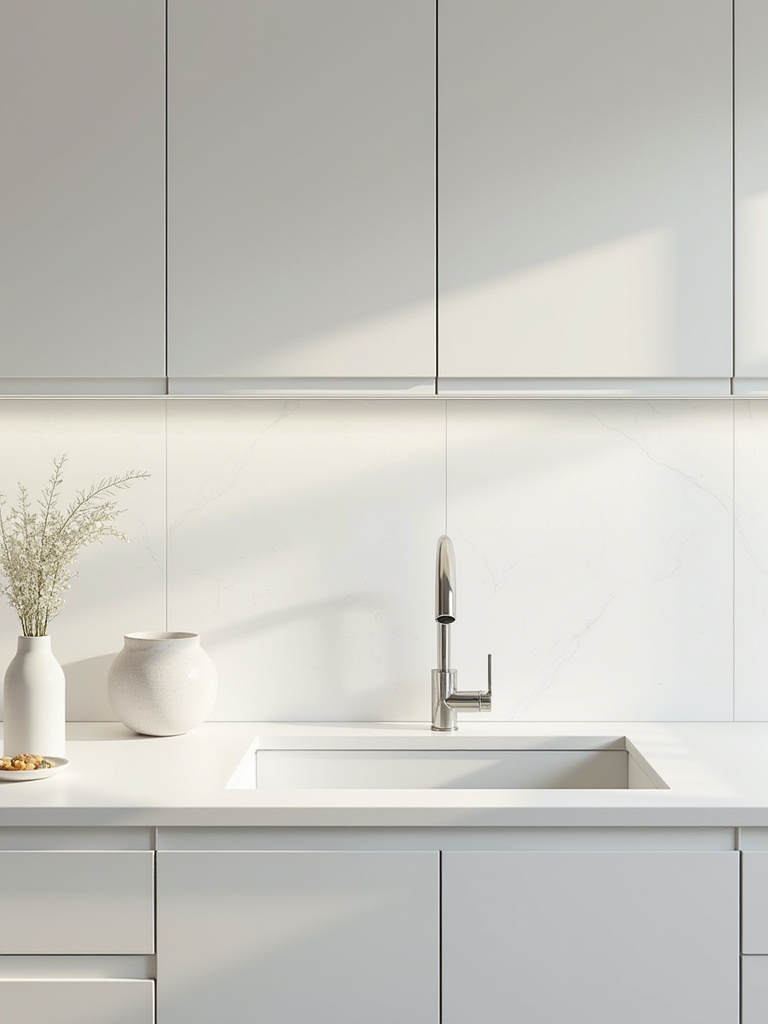
This is a wonderful way to bring a sense of calm and serenity to a kitchen. It’s clean, expansive, and lets other elements—like a beautiful piece of pottery on the counter or a vibrant textile on a chair—be the focal point. It’s a quiet, confident backdrop.
7. Selecting Sophisticated Natural Stone Options Like Marble or Quartzite
Natural stone is the earth’s own art. Every slab of marble or quartzite has a story that’s millions of years old, written in its veins and colors. To me, using it as a backsplash is like hanging a landscape painting in your kitchen. The movement in the stone can feel like flowing water, shifting sands, or a cloudy sky. It’s a living material that changes with the light throughout the day.
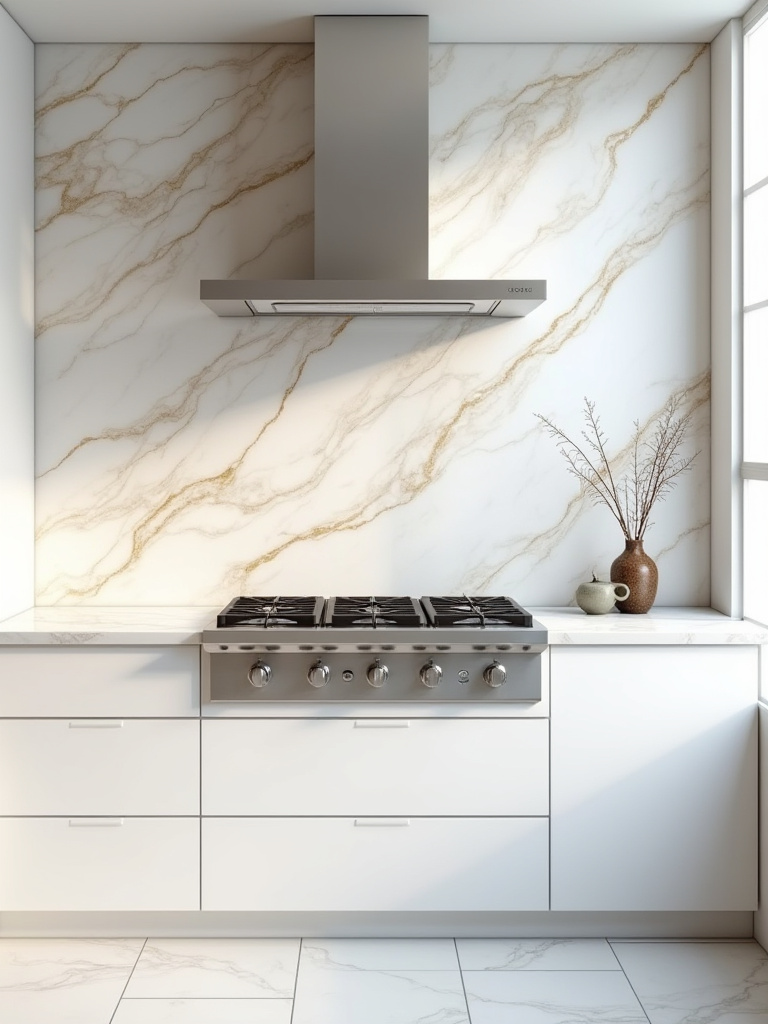
My advice? Go to the stone yard yourself. Don’t pick from a tiny sample. Walk the aisles and wait for a slab to speak to you. It’s a very personal connection. Find one that feels right, that has a story you want to look at every day. Yes, it requires care—sealing it is a ritual of respect—but the profound, organic beauty it brings to a home is absolutely worth it.
8. Exploring Unique Porcelain and Ceramic Finishes for Tactile Interest
Oh, my heart! This is where we get to talk about the human hand. The most beautiful ceramic and porcelain tiles are the ones that aren’t perfectly flat or uniform. Think of the rich tradition of Talavera tiles from Puebla, where artisans have been hand-painting ceramic for centuries. Each tile is slightly different; you can feel the energy of the brushstrokes in the glaze.
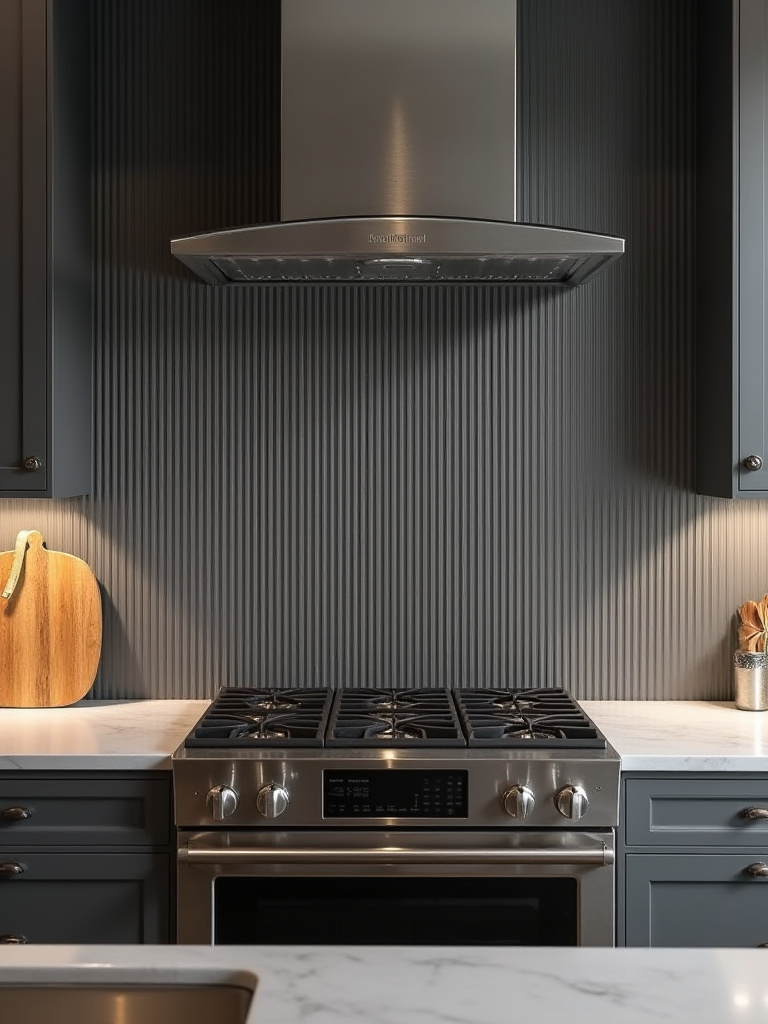
These are not just tiles; they are small works of art. You can use them to create a stunning, colorful mosaic, or you can choose tiles in a single color but with a handmade, slightly undulating texture. When the light hits them, they shimmer and create a sense of movement. This texture is what I mean by soul. It’s the proof that a person, not a machine, made this for your home.
9. Utilizing Glass Backsplashes for Reflective Qualities and Visual Depth
Glass can feel a little cold, but let’s re-imagine it. Think about recycled glass tiles in shades of seafoam green and ocean blue. They can catch the light like sea glass on a beach in Tulum, creating a shimmering, watery effect that makes a small kitchen feel bright and alive.
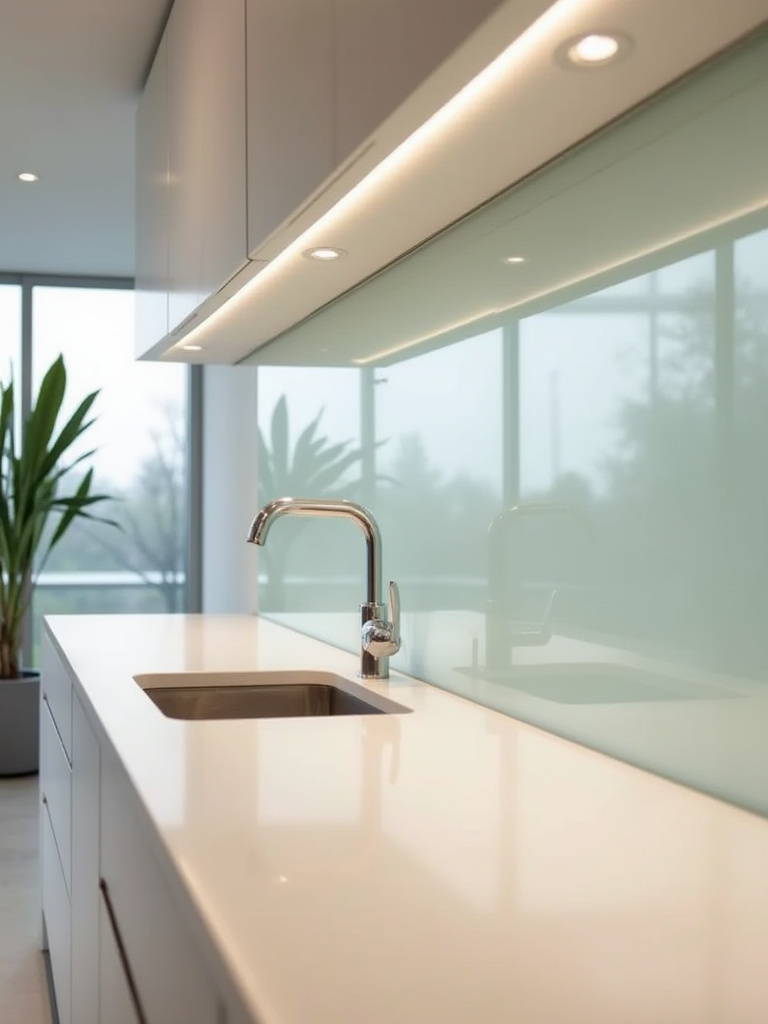
The reflective quality of glass is undeniable. It bounces light around and adds depth, which is a gift in a compact space. Instead of a solid sheet, consider smaller, handcrafted recycled glass tiles. They have more character and their slight variations in color and texture can add a layer of artisanal beauty that keeps the material from feeling too sterile.
Mastering Modern Materials and Textural Choices (Part 2)
Why speak in one voice when you can create a beautiful harmony? Combining materials is like a good conversation—full of interest, texture, and surprise. And choosing materials that are kind to the earth is a way of ensuring our traditions can continue for generations to come.
10. Incorporating Mixed Materials to Create Distinctive Zones
This is one of my favorite ways to add personality! Your kitchen isn’t just one big room; it has little neighborhoods. There’s the fiery heart of the stove, the cool oasis of the sink, the cheerful little coffee corner. Why not give each one its own identity?
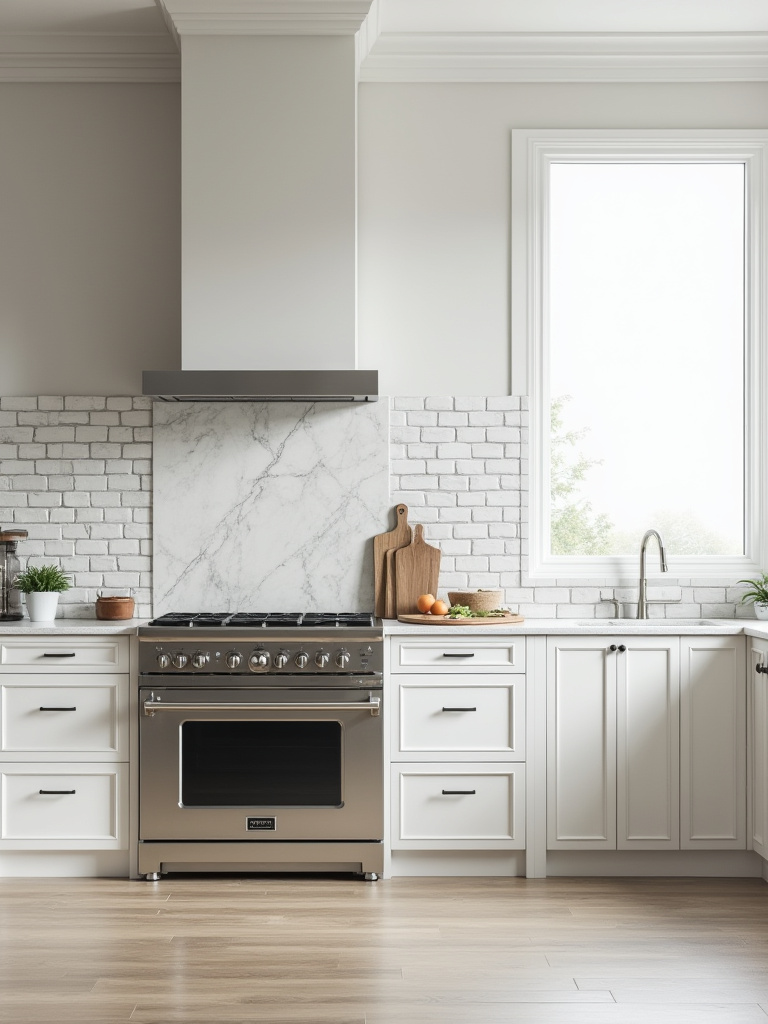
Use a durable, easy-to-clean material like stainless steel or a large porcelain slab right behind the cooktop. Then, in the coffee nook, create a jewel-box moment with a panel of stunning, patterned cement tiles. This mix of the practical and the poetic makes a space feel so custom and thoughtful. It’s a design that unfolds, revealing little surprises as you move through the room.
“Mixing materials is like hosting a great dinner party. You invite different personalities—the quiet and strong one, the vibrant and chatty one—and together they create a beautiful, dynamic energy.”
11. Choosing Sustainable and Eco-Friendly Backsplash Options for a Greener Home
The deepest traditions are rooted in the earth. So many of the crafts I love use local clay, natural pigments, and sustainable practices because for centuries, that’s all there was. Today, we can make that same choice consciously. A backsplash made of terracotta or barro is literally made of the earth, and it brings an unparalleled warmth and humility to a space.
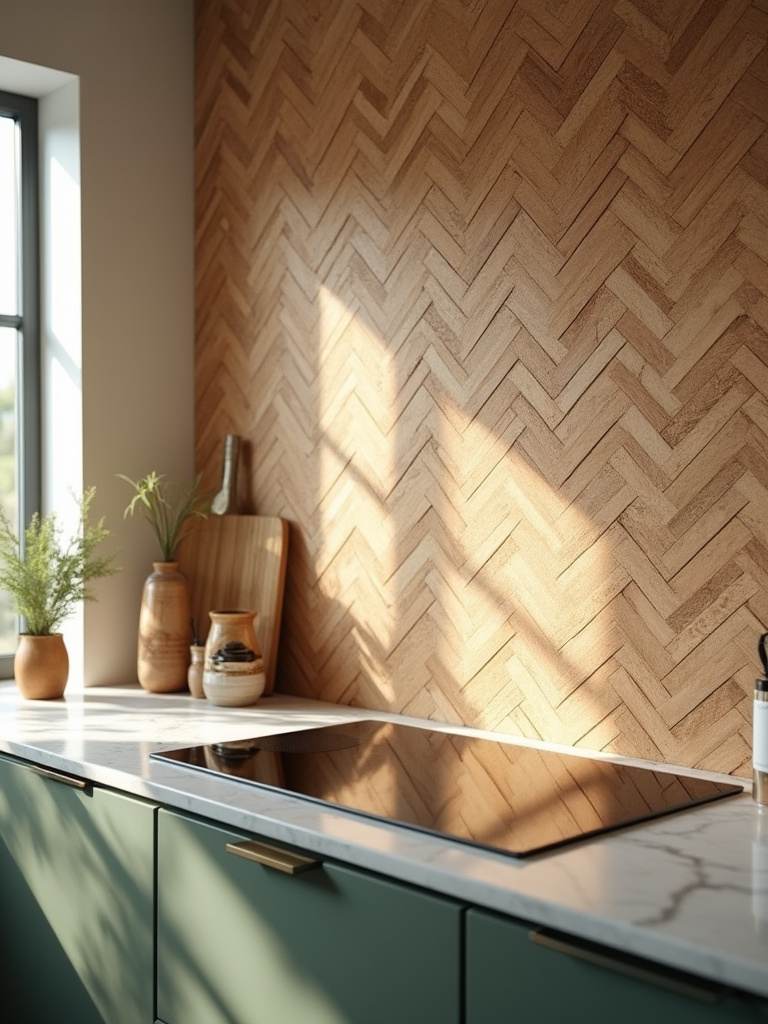
Look for tiles made from recycled materials, reclaimed wood from an old hacienda, or tiles made by artisans in your own region. Choosing sustainably isn’t just about being “green”; it’s about connecting your home to the natural world in an authentic way. It feels good on a soul level to be surrounded by materials that have a positive story.
Designing for Seamless Integration and Visual Impact
The big choices are made. Now it’s time for the details, and the details are everything. This is where you elevate your backsplash from simply a “choice” to a truly integrated part of your home’s design language, ensuring it makes the most powerful and beautiful statement possible.
12. Experimenting with Modern Patterns: Vertical Stack vs. Herringbone
Pattern is rhythm. It’s the beat of your kitchen’s heart. You can take a very simple, classic tile—like a subway tile—and give it a completely modern voice just by how you lay it. A vertical stack feels clean, contemporary, and aspirational, drawing your eye up to the ceiling. It can make a traditional, handmade tile feel fresh and unexpected.
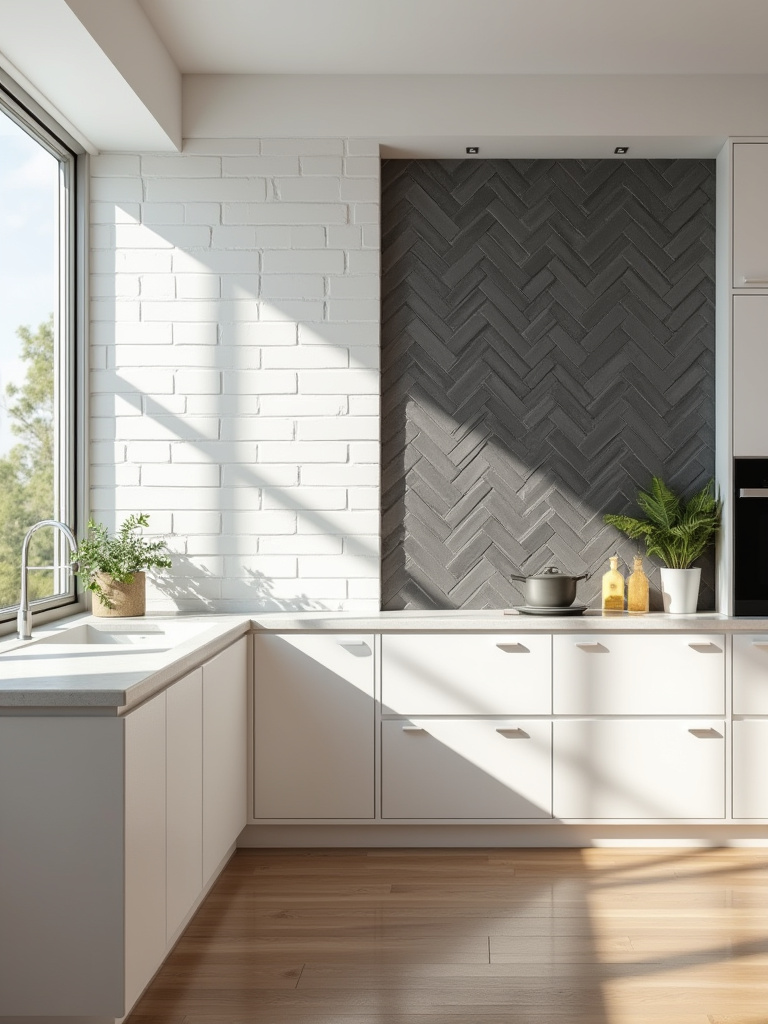
A herringbone pattern, on the other hand, adds a beautiful sense of movement and history. It has a classic, handcrafted feel that speaks to fine artisanship. I love using a terracotta tile in a herringbone pattern to create a floor-like texture on the wall—it feels rustic, warm, and deeply rooted. Don’t be afraid to play; lay the tiles out on the floor first and see which rhythm speaks to you.
13. Extending Your Backsplash Beyond Countertops for High-Impact Drama
We touched on this before, but it’s worth repeating because it’s such a powerful move. Taking your backsplash all the way up the wall is like giving your kitchen a great, big, beautiful hug. It creates a sense of enveloping warmth and turns the material into a true architectural feature.
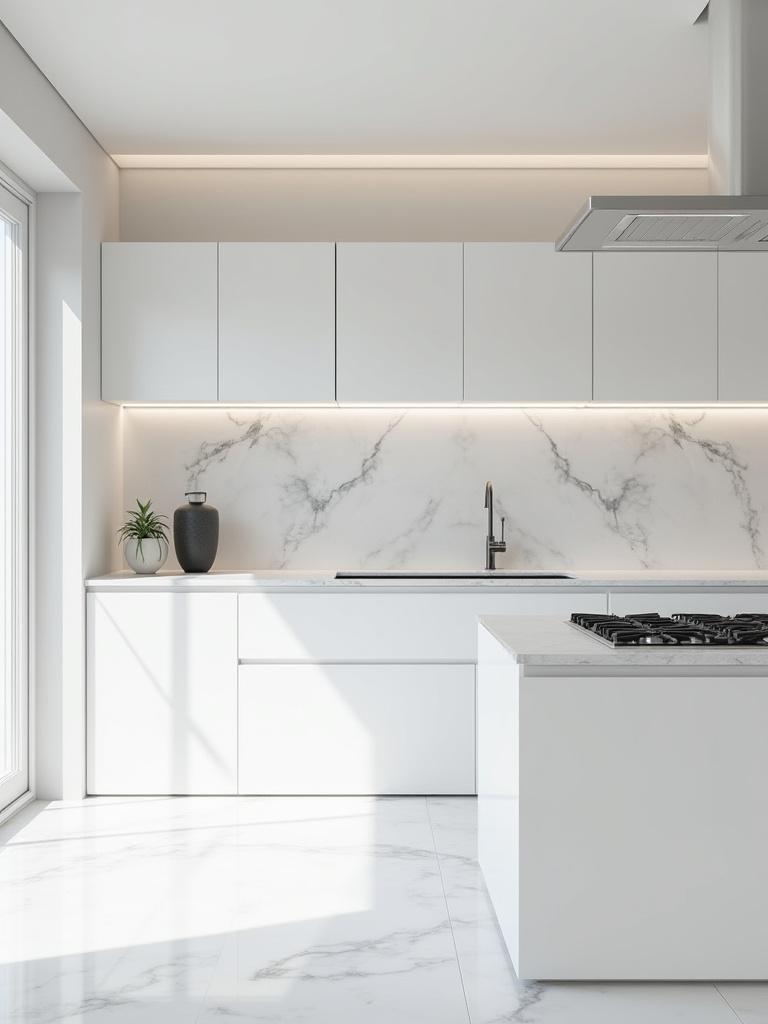
This works especially well when you are creating a focal point around the stove. Frame out that space with tile all the way to the ceiling, creating a kind of modern hearth or chimenea. It anchors the entire room and declares that this space is for nourishment, for gathering, for life. It’s a bold statement that says you believe beauty shouldn’t be contained to a small, practical box.
14. Integrating Outlet Covers Flush and Discreetly into Your Backsplash Design
Nothing ruins a beautiful story faster than an ugly, glaring white plastic outlet cover. It’s like a typo in a beautiful poem. Please, don’t let this be an afterthought. Plan for this from the beginning with your installer and electrician.
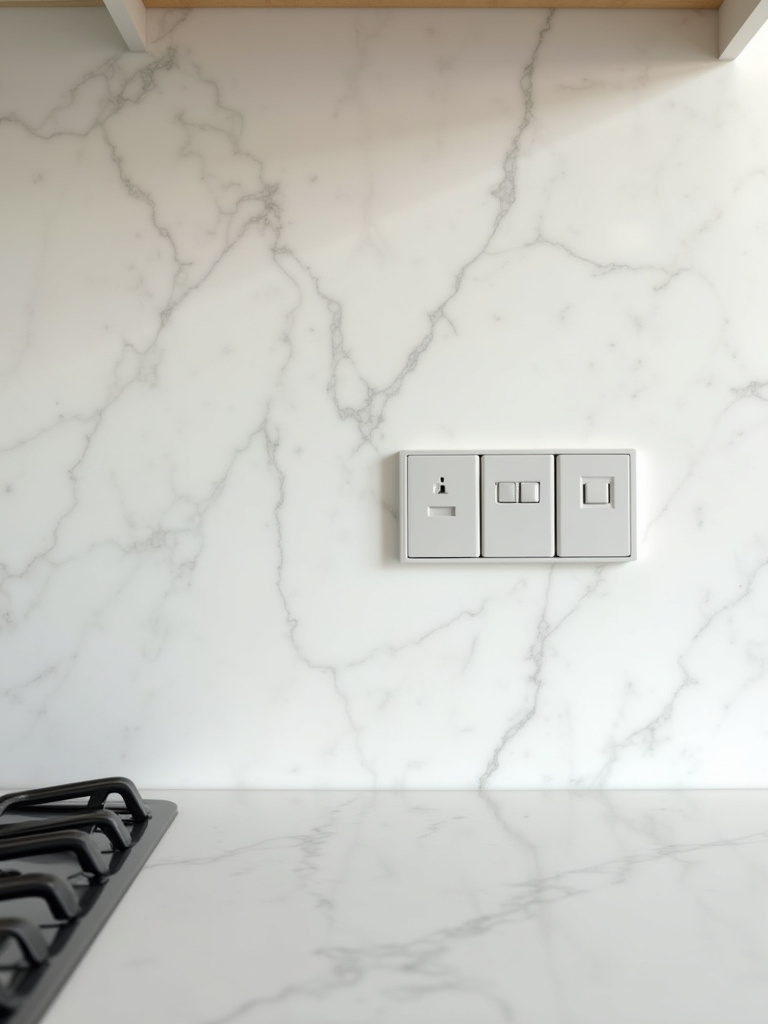
There are amazing options now that allow outlets to sit completely flush with the wall. You can even get systems where a piece of your actual tile or stone is cut to fit into the cover, making it nearly invisible. It is a small detail that makes a world of difference. It shows a level of care and intention that honors the beautiful materials you’ve chosen. Don’t let the noise of modern convenience interrupt the visual peace.
15. Adding Task-Enhancing Under-Cabinet Lighting for Ambiance and Functionality
Light is the final ingredient. It’s what brings your materials to life. Good under-cabinet lighting isn’t just for chopping onions; it’s for making your backsplash glow. It’s called “wall grazing,” and it’s a beautiful technique where light washes down the face of the tile.
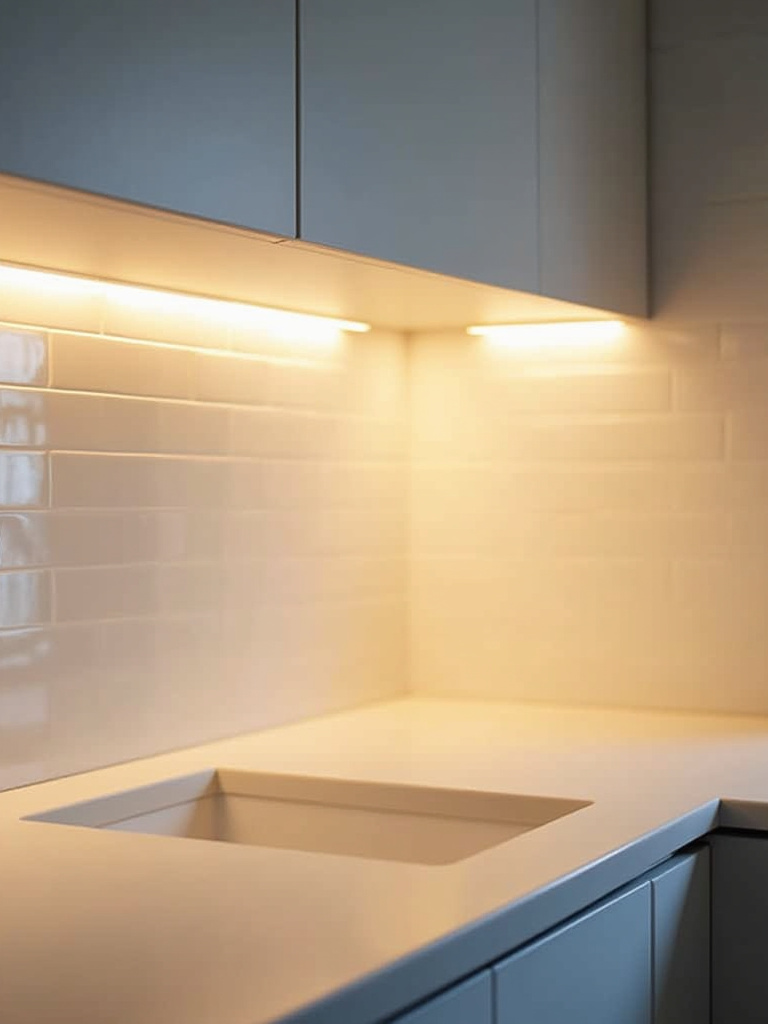
This is especially magical on a tile with texture. The light will catch all the little ridges and undulations of a handmade ceramic tile, highlighting the human touch. It will make the subtle colors in a natural stone shimmer and dance. Adding a dimmer is essential. You can have bright, clear light when you’re working, and a soft, warm glow for a quiet evening atmosphere. It changes the entire mood of the room.
Smart Styling, Finishing Touches, and Long-Term Care
You’ve created something beautiful. Now, how do you frame it, finish it, and care for it so that it lasts a lifetime? These final steps are a ritual of love and respect for the craft and beauty you’ve brought into your home.
16. Harmonizing Grout Color Precisely with Your Chosen Backsplash Material
Grout is the frame for your art. Think about it that way. Do you want a frame that stands out or one that blends in? If you have chosen a tile with a beautiful, intricate pattern—like a classic colorful cement tile—a neutral grout that matches the background color will let the pattern be the star.
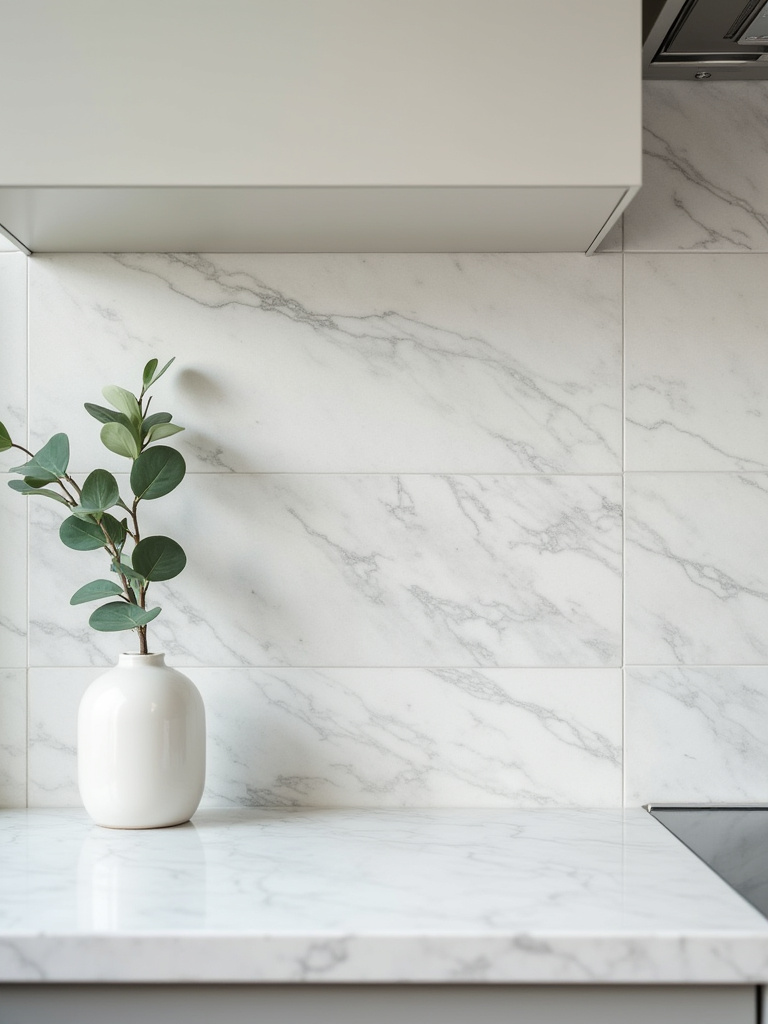
But if you are using a simple, solid-colored tile in an interesting pattern like a herringbone, a contrasting grout can be amazing. A dark charcoal grout with a simple white tile creates a bold, graphic look that highlights the pattern itself. Just be careful with white grout in the cooking zone. I prefer a light gray or a taupe; it has the same fresh feel but is so much more forgiving!
17. Considering a Full Mirror Backsplash to Enlarge Small Kitchen Spaces
A mirror backsplash can be a bit tricky—it can feel very 80s if not done right. But used thoughtfully, it’s a secret weapon for a small, dark kitchen. It’s a classic trick used in Latin American architecture to bring light into interior spaces. Think of it not just as a mirror, but as a window that doesn’t exist.
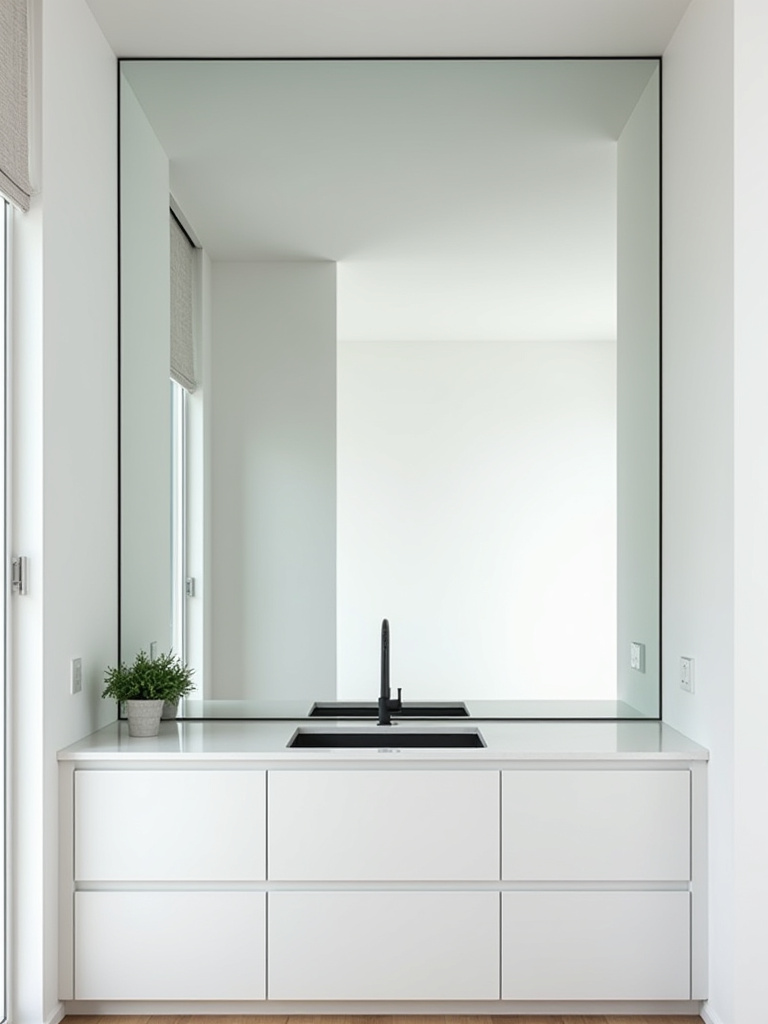
I love using an antiqued or smoked mirror. It has a softer, more mysterious quality than a stark, clear mirror. It reflects light and movement in a gentler way, creating an illusion of depth without being jarring. It can add a touch of old-world glamour and make a tiny kitchen feel wonderfully expansive and bright.
18. Protecting Your Investment with Regular Sealing and Appropriate Cleaning Practices
Caring for your backsplash is like tending a garden. It’s a simple act of love that keeps beauty alive. If you chose a porous material like natural stone, terracotta, or cement tile, sealing it is non-negotiable. It’s a shield that protects it from the inevitable splatters of oil, wine, and tomato sauce.
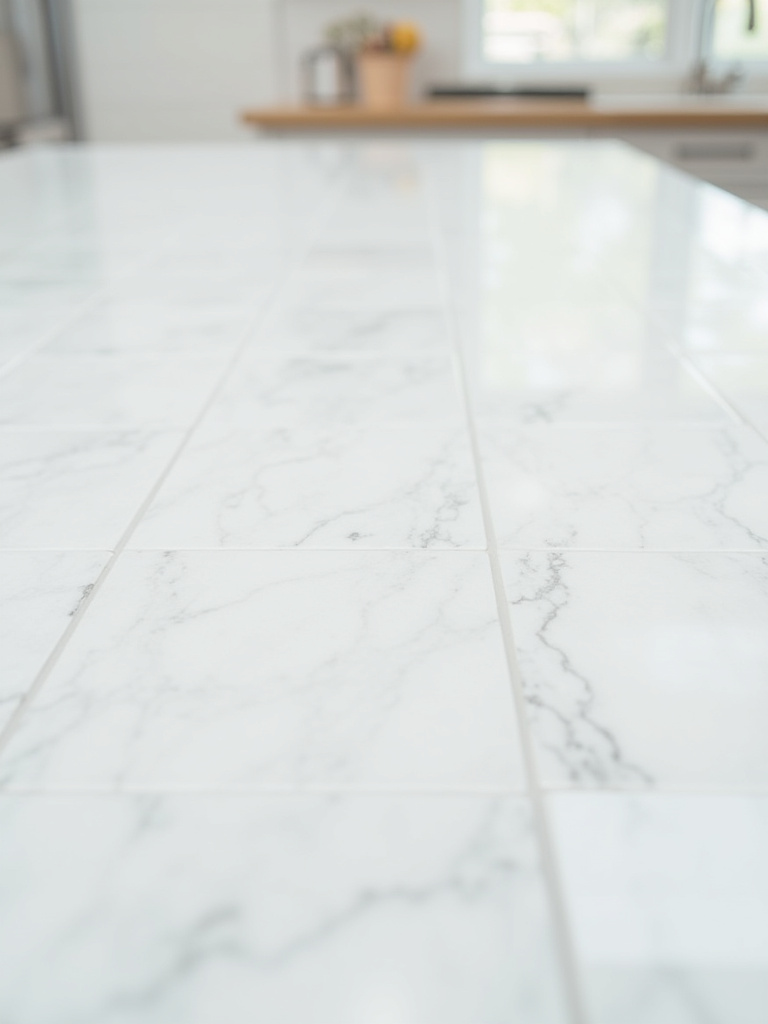
The sealing process itself is a ritual. You clean the surface, apply the sealer with care, and let it cure. Re-sealing every year or two becomes a little anniversary for your kitchen. And for daily cleaning, please be gentle. Avoid harsh chemicals. A simple, pH-neutral cleaner is all you need. You are caring for a piece of the earth, a piece of someone’s life’s work. Treat it with kindness.
19. Avoiding Common Backsplash Installation Mistakes for a Flawless Finish
The final and most crucial piece of advice is to honor the process. A beautiful tile installed poorly is a tragedy. Whether you are doing it yourself or hiring a professional, do not rush the preparation. The wall must be clean, flat, and ready to receive the tile.
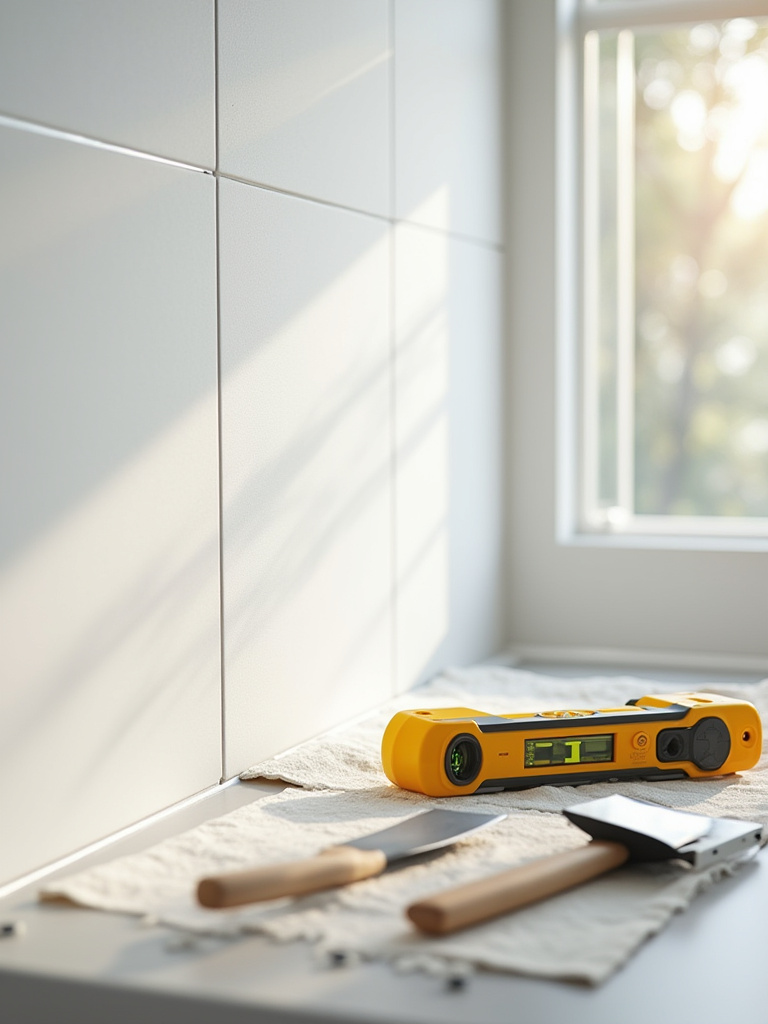
Planning the layout is also essential. You don’t want to end up with tiny, awkward slivers of tile in a visible corner. A good installer will lay out the tiles first to ensure the pattern looks balanced and the cuts are thoughtful. This is what separates craft from construction. It’s the final act of respect for the materials and for your home. It’s the difference between a surface that’s just “done” and one that truly sings.
Conclusion
So you see, a kitchen backsplash is so much more than a functional necessity. It is the heart of your kitchen, a canvas for your story, a place to connect with generations of artistry. Whether you choose the earthy honesty of terracotta, the hand-painted joy of Talavera, or the quiet strength of natural stone, you are making a choice to infuse your home with soul. You are choosing to honor the human touch in a world that can often feel too manufactured.
These ideas are not a set of rules, but an invitation. An invitation to look at that simple wall in your kitchen and see a world of possibility. Now is the time to gather your inspiration, to trust your heart, and to create a space that doesn’t just look beautiful, but feels like home. Take these ideas and make them your own. Your kitchen is waiting for its story.
